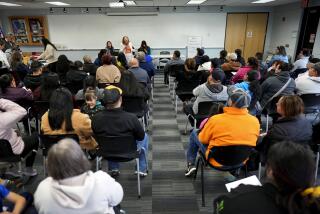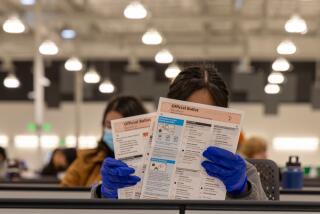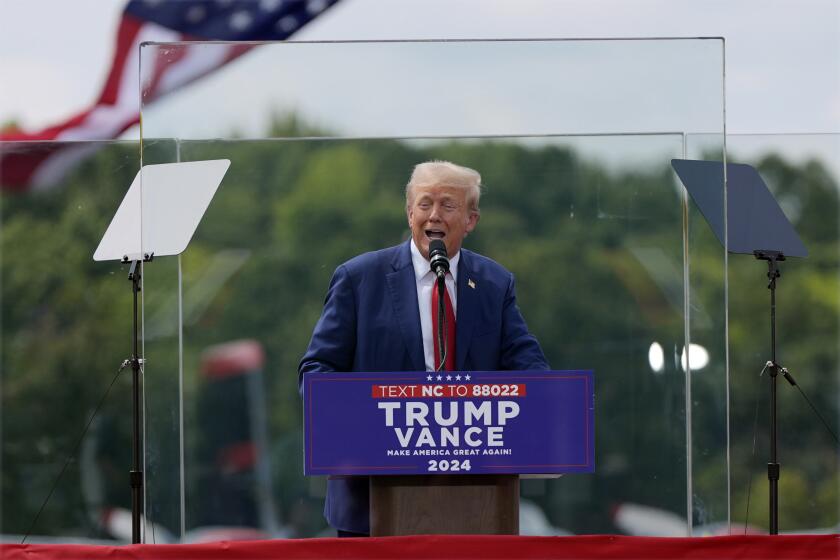Not caucusing? Most of Iowa won’t either
The downtown hot spot Centro hummed with energy for yet another night this week. Operatives for at least four would-be presidents huddled in separate corners of the glowing dining room. America’s top political journalists table-hopped furiously. Everyone counted the hours until the Iowa caucuses.
Well, not quite everyone.
Dylan, the waiter who’s moving to Los Angeles to be a fashion model, just tried to keep the plates of pancetta-wrapped shrimp and limoncello tiramisu coming. Asked whether he was ready to help pick the next president by attending Iowa’s first-in-the-nation caucuses, he responded: “Uh, what nights are they on?”
The nation’s eyes may be on them and the candidates may be beating on their doors, but most Iowans will go nowhere near the 1,781 schools, churches and auditoriums where their fellow citizens will cast the first judgment of the 2008 presidential campaign.
While California and other states wage war for the kind of candidate attention and media hype afforded this state every four years, at least 1.7 million of some 2 million eligible Iowa voters will sit out Thursday’s caucuses. As usual, they will leave the decision to a contingent of political activists who are mostly older, whiter and more highly educated than the rest of the nation.
The reasons that most Iowans stay away range from the practical to the philosophical to the emotional. They can’t get away from jobs or responsibilities at home. They don’t like politics. They don’t believe their vote will make a difference. They feel oppressed by the ceaseless phone calls and television ads.
Unlike primary voters in other states, who can vote by mail or drop by a polling place for a few minutes, Iowa caucus-goers must commit to several hours of political dialogue on a work night, sometimes far from home.
Even if they want to contend with snow and icy roads, some just can’t get away.
Karla Hobbs, a dispatcher for the Ames Police Department and an undecided Democrat, was eagerly anticipating the hustle of the caucus, but can’t leave her post before the 7 p.m. caucus start time, particularly with staff stretched thin for the holidays.
“I’m disappointed,” said the 46-year-old Ames resident. “I feel left out.”
Many campaigns offer rides, even baby-sitting, to try to reduce the logistical difficulties.
“That’s great, but I have four kids and the two oldest have to be at wrestling practice that night,” said Luann Miklus, who was ice skating with her children at a rink within view of the state Capitol here, “and none of them said they could drive my kids around, so I don’t have the luxury. It’s a no-go.”
Many other Iowans view the hubbub -- candidates’ motorcades, rallies and endless news reports -- as an orbit far from their own.
Kindra Osborn works at a Des Moines pizza parlor and regularly serves the bright-eyed young operatives for two Republican contenders -- Mike Huckabee and Ron Paul -- headquartered just around the corner. But the 19-year-old hardly recognizes the political world on the other side of the counter.
“I work two jobs,” said Osborn, who puts in 60-hour weeks. “Whatever free time I have, I try to spend with my daughter. She’s 3.”
Others feel as if they hardly got a respite from the 2004 contest before this race began.
“They have bored us to death with it this year,” said LaVerne Sieren, a 67-year-old farmer who parked himself behind a draft beer to watch college football at a West Des Moines bar.
In the 2004 general election, Iowa voter turnout at 72% was slightly above that of the nation as a whole. But Iowans are similar to other Americans in remaining uninvolved in most other aspects of the political process, said Dennis Goldford, a professor of politics at Drake University in Des Moines.
Research has shown that no more than a third of the nation’s population will take a political action -- such as attending a rally, making a donation or contacting an elected official -- beyond voting, Goldford said. So caucus turnout of 20% or less should not be surprising, he said.
“The metaphor I have for this is like when I am in the back of the airplane,” Goldford said. “I want to know if the pilot can fly the plane and if the plane is going in the direction I want to go. Other than that, people feel, ‘Don’t bother me, leave me alone to lead my life.’ That’s where most people are in regard to politics.”
So why does small and homogeneous Iowa remain the first test of the presidential campaign season? Mostly because it wants to. And the candidates and the media have grown comfortable with the tradition -- at home in a state that is relatively easy to navigate and where political advertising comes relatively cheap.
Iowa has institutionalized its premier position with a law requiring the parties to move the caucuses before any other state’s nominating contest. That helped push this year’s caucuses to their earliest date ever -- just after the holiday season.
Iowans insist that they have become skilled like few others at grilling the presidential hopefuls. But the fight to give another state the prime spot on the campaign calendar certainly will be renewed in 2012.
Bruce Cain, a UC Berkeley political science professor, said Iowa caucuses should not be preeminent for several reasons, particularly the state’s lack of racial and ethnic diversity and the relatively small number of participants.
“Barack Obama and others are trying to expand it, but the caucuses pretty much belong to the party regulars,” Cain said. “I just don’t think that’s the best way to do it.”
Researcher Nona Yates in Des Moines contributed to this report.
More to Read
Sign up for Essential California
The most important California stories and recommendations in your inbox every morning.
You may occasionally receive promotional content from the Los Angeles Times.












